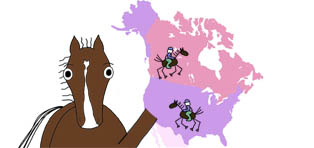November 6, 2009
For immediate attention
www.ColoradoHorsecouncil.com
New Import Requirements for Horses Coming into CO from Texas
State Veterinary Office representative to attend CHC annual meeting Nov.15
Colorado Department of Agriculture has announced movement restrictions or additional entry requirements for horses from Texas due to the detection of equine piroplasmosis in South Texas.
To answer your questions, a representative of the Office of the Colorado State Veterinarian will be at the annual meeting of the Colorado Horse Council, at 1:00 p.m. on Sunday, November 15, at the Pro-Rodeo Hall of Fame in Colorado Springs. Anyone interested is welcome to attend; call (303) 292-4981 for more information.
Equine piroplasmosis is a serious tick-transmitted blood disease of equine animals, such as horses, donkeys, mules and zebras; the disease may be carried and transmitted by as many as 15 species of ticks. Although ticks have been collected from the South Texas ranch for testing, final results are not complete, and it is not known whether any of the ticks can serve as a host for the disease.
The Colorado Department of Agriculture has issued the following requirements:
Equine originating from any premises under quarantine for equine piroplasmosis shall not enter Colorado. Equine originating from Kleburg, Nueces, Kenedy, Willacy, Jim Wells, or Brooks County or any other county in which piroplasmosis is diagnosed, may enter into Colorado providing they are accompanied by a Certificate of Veterinary Inspection (CVI) issued by an accredited veterinarian within ten (10) days prior to entering Colorado. The CVI shall contain the following information:
* Negative piroplasmosis cELISA and CF tests for Theileria (Babesia) equi within the past 90 days prior to import into Colorado including an original copy of the test or National Veterinary Services Laboratory (NVSL) accession number. (The NVSL is the only approved laboratory for equine piroplasmosis testing);
* A negative Equine Infectious Anemia test within the past twelve (12) months;
* A Colorado import permit number; and
* The following statement by the accredited veterinarian signing the CVI, "I personally inspected the equine listed on this certificate. They do not originate from an equine piroplasmosis quarantined premises, were inspected for ticks, and were treated prophylactically for ticks at the time of the inspection."
(Treatment for ticks shall include any topical pyrethroids or other equine labeled tick treatment product.)
Imported equine that remain permanently in Colorado shall upon arrival at the destination premises be held separate from all other equine until they are:
* physically examined by an accredited veterinarian approved by the state veterinarian;
* retested 30 days after import and determined to be cELISA negative;
* any equine that subsequently tests cELISA positive to piroplasmosis shall be quarantined and shall not remain in Colorado.
Changes in import requirements may develop as new information becomes available to better define the extent of the outbreak. For updated information refer to http://www.tahc.state.tx.us/ or http://www.colorado.gov/cs/Satellite/Agriculture-Main/CDAG/1183672504470 or call 303-239-4161.

No comments:
Post a Comment